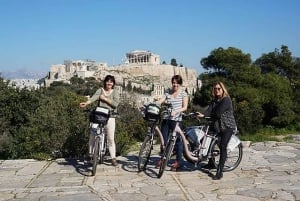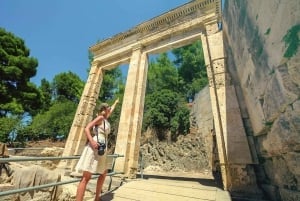Practical Info
PASSPORT AND VISA INFORMATION
Please note that Visa requirements are subject to change at any time. Tourists should check with their individual Consulate for the most up to date information.
• Citizens from EU countries, including Norway and Iceland, are only required to have a valid passport or a national identity card to enter Greece. EU citizens can stay indefinitely in Greece.
• US, Canadian, Australian, New Zealand citizens and non-EU countries require a passport for entry and can remain as tourists for up to 90 days. Citizens of these countries will also receive mandatory entry and exit stamps in their passports.
• As with most countries, it is required that all passports are valid for at least another six months and are not close to expiration.
• Please note that a fine is imposed in the event of extending your stay without prior obtain of visa extension.
• Unless visitors are of Greek origin, those from non-EU countries are only legally allowed one six month extension to the tourist visa.
CURRENCY
Since 2002 the national currency has been the Euro (€). The Euro is available in denominations of €5, €10, €20, €50, €100, €200 and €500 notes, while coins come in 0.01, 0.02, 0.05, 0.10, 0.20, 0.50 cent (lepta in Greek) €1 and €2.
You can exchange currency at the airport, at private currency exchanges and banks. Credit cards are accepted in all large hotels, restaurants and shops (some places require your national ID card), but smaller businesses like tavernas, accept only cash. There is a plethora of ATMs around Athens (present outside almost every bank branch).
Click to access to currency converter calculator: xe.com/currencyconverter/
DIALLING CODE
The international dialling code for Greece is +30. The area code for Athens is 210.
LOCAL TIME
Athens time is seven hours ahead of Eastern Standard Time, two hours ahead of Greenwich Mean Time, and one hour ahead of Central European Time.
ELECTRIC CURRENT
The standard electric current in Greece is 220V (50Hz) alternating current; round two- or three- pin plugs are standard. Appliances from North America require a transformer and British ones an adaptor.
LANGUAGE
Greek is the official language in Greece. Most Athenians especially young people and those working in tourism and shops speak fluent English. French, Italian and German is also widely spoken. Signage, menus and transportation signs are written in Greek and English. Communication should be fairly easy. Try to learn a few words; it will make your visit more exciting and you will surely feel more at home with the locals.
RELIGION
The constitution of Greece recognizes the Orthodox faith as the prevailing of the country, while guaranteeing freedom of religious belief for all. According to the State Department, an estimated 97% of Greek citizens are Orthodox Christians.
TIPPING
If you are happy with your meal and service it is accustomed to tip 10% of your bill. During the Holy Week and Christmas restaurants add an obligatory 18% to the bill for the waiters.
BUSINESS HOURS
Banks: Opening Hours Monday - Thursday, 08:00 - 14:00 and on Fridays 08:00 – 13:30.
Shops: In general shops open 09:00-15:00 Monday, Wednesday and Saturday; 09:00-14:30 and 17:00-20:30 Tuesday, Thursday and Friday. Shopping malls, shops in tourist areas, florists and bakeries open usually at 10:00 and often do not close for lunch. Chemists are closed on Saturdays.
SALES TAX
VAT of 18% is included in the price of most items in Greece. Edible products are taxed at 8.50%.
POST OFFICES
Post boxes are yellow and have separate slots for national and international mail. Airmail letters and postcards take about 3 days to reach EU countries, and around 6 days to reach the US, Australia and New Zealand. The most central post office is at Mitropoleos Street, close to Syntagma square and operates: 07:30-20:00 Monday-Friday, 07:30-14:00 Saturday and 09:00-13:30 on Sundays. Other post offices around Athens are open 08:00-14:00 Monday-Friday.
SECURITY
Athens is still one of the safest cities in Europe. It is however advisable to take the logical precautions: lock the car, keep valuables in a safe face, avoid walking in dark, quiet streets alone and always take good care of your bag, wallet and passport.
WHEN TO VISIT
Athens is a major cultural centre with significant events occurring all year round and thus is highly visited all year round. During the summer many visitors pass through Athens on the way to the islands and can sometimes be packed with tourist excursion groups. In August the city is much less crowded as most of the Athenians leave the city for their holidays but even though fairly serene it is not quite the best time to visit as the weather can be hot and humid. The ideal time to visit is either late spring or early autumn, when the weather is mild and the atmosphere more pleasant and relaxed.
WHAT TO PACK
Athens is a cosmopolitan capital. Athenians like to be clean and stylish; with the older generation dressing up more formally and the younger generation in a more smart casual, comfortable chic style. Most expensive restaurants and clubs require more formal dressing.
In the summer pack light clothing in light colours. Make sure to include comfortable or athletic shoes for walking and visiting archaeological sites in comfort. Of course, do not forget your swimming suit, sunglasses and sun block protection for the wonderful days on the beach. If you are heading to the beautiful Greek islands then flat shoes are highly recommended to wonder around the pebbled-stoned streets at ease! Remember to also pack some items with long sleeves and trousers or long skirt so you can cover respectably when visiting churches and monasteries. During the winter you will certainly need warm clothes, coat and boots. If you are planning to head up the snowy mountains for ski, pack your ski attire, gloves and scarf.
However, in the case you forget something then no worries in Athens you can find and buy everything!
COSTS
Greeks strongly complain that living costs have risen significantly since the introduction of the Euro in 2002. In general the prices are similar to other EU countries, except for taxis and public transport which are much cheaper.
|
Indicative prices: |
|
Meal at a casual restaurant €12.00 |
|
Meal for 2, med-range restaurant, three course: €41.00 |
|
Domestic Beer (0.5 l draught): €3.32 |
|
Cafe Late: €3.00 |
|
Imported Beer (0.33l bottle): €1,40 |
|
Water (0.33l bottle): €0.51 |
|
Milk regular (1l): €1.24 |
|
Local transport (one-way ticket): €1.70 |
|
Taxi (5km within the centre): €6.09 |
SMOKING
According to EU surveys Greeks smoke twice as many cigarettes per capita as the European average. Smoking was officially banned in all public spaces in 2002 and reinforced in 2010. Until today Greeks have failed to fully comply with the law.
HEALTH AND SAFETY
EU countries citizens are entitled to free basic medical care based that they are holders of an EHIC (European Health Insurance Card). Visitors from non-EU countries, US, Canada, Australia and New Zealand are not covered by the Greek health system and will be required to pay for any treatment, except for emergency casualty visits. It is advisable to consult your social security agency for information before travelling.
|
In case of emergency call: |
|
Ambulance Service: 166 |
|
SOS Doctors: 1016 |
|
Duty Hospitals and Clinics: 1434 |
|
Pharmacies: 1434 |
|
Open Line for alcohol drug Addiction: 210 361 7089 |
|
Poisoning First Aid: 210 779 3777 |
|
Police: 100 |

























